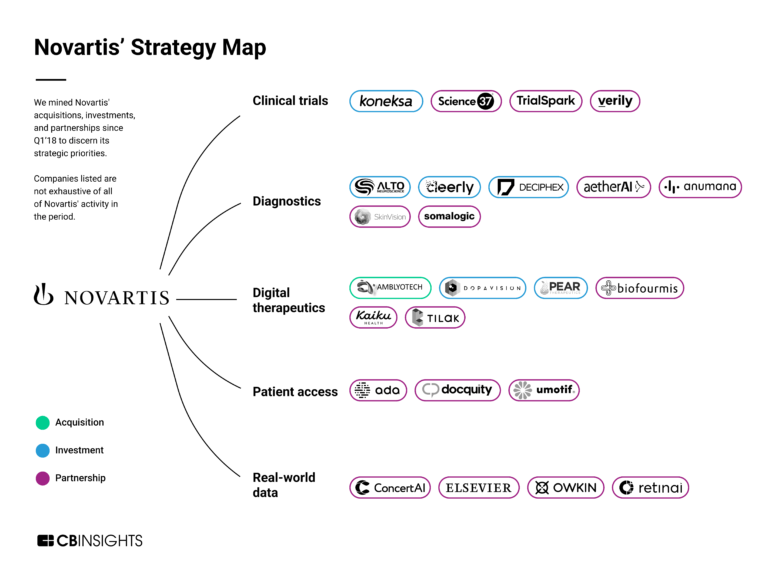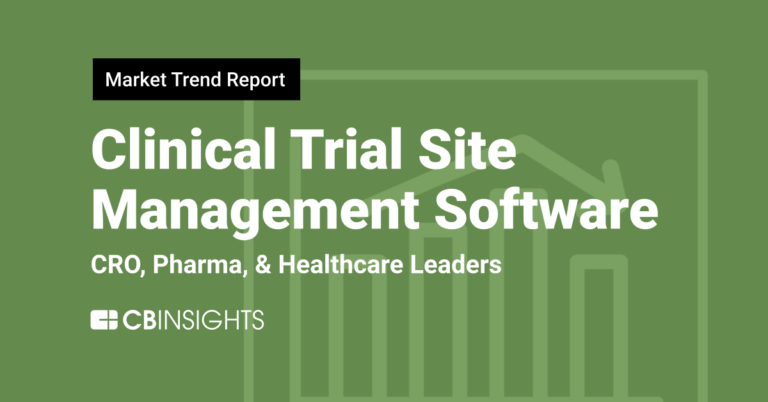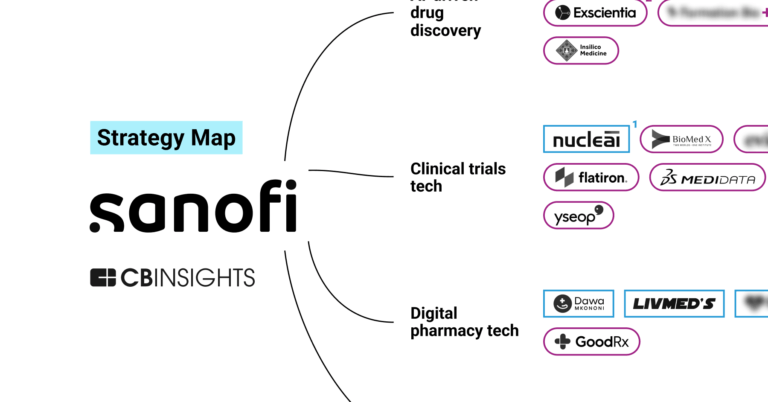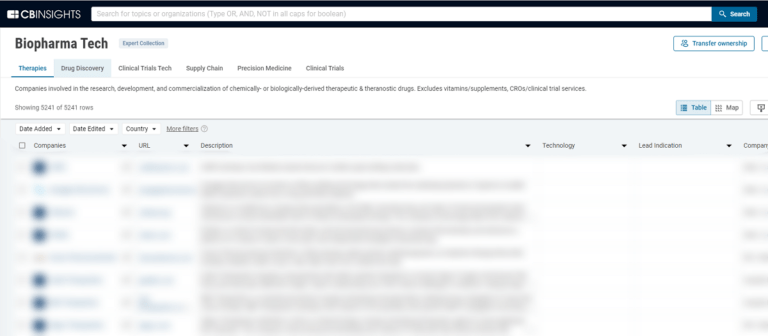
Formation Bio
Founded Year
2013Stage
Series D | AliveTotal Raised
$610.3MLast Raised
$372M | 4 mos agoMosaic Score The Mosaic Score is an algorithm that measures the overall financial health and market potential of private companies.
+111 points in the past 30 days
About Formation Bio
Formation Bio is a tech-driven, AI-native pharmaceutical company focused on drug development. The company specializes in acquiring and developing clinical-stage drugs more efficiently by leveraging a proprietary technology platform that incorporates artificial intelligence. Formation Bio primarily serves the pharmaceutical industry by expediting the drug development process for various therapeutic areas. It was formerly known as TrialSpark. It was founded in 2013 and is based in New York, New York.
Loading...
Loading...
Research containing Formation Bio
Get data-driven expert analysis from the CB Insights Intelligence Unit.
CB Insights Intelligence Analysts have mentioned Formation Bio in 4 CB Insights research briefs, most recently on Jun 27, 2024.


Expert Collections containing Formation Bio
Expert Collections are analyst-curated lists that highlight the companies you need to know in the most important technology spaces.
Formation Bio is included in 2 Expert Collections, including Unicorns- Billion Dollar Startups.
Unicorns- Billion Dollar Startups
1,249 items
Digital Health
11,109 items
The digital health collection includes vendors developing software, platforms, sensor & robotic hardware, health data infrastructure, and tech-enabled services in healthcare. The list excludes pureplay pharma/biopharma, sequencing instruments, gene editing, and assistive tech.
Latest Formation Bio News
Sep 27, 2024
↑ CEO Benjamine Liu Total raised More than $600 million Headquarters New York, NY During his doctorate work at the University of Oxford, Benjamine Liu came across what he thought were some promising potential drugs for use against Alzheimer’s and Parkinson’s. When he pitched them as candidates to several pharmaceutical executives, he expected enthusiasm. Instead, he was told that the industry’s biggest problem wasn’t finding new drugs. It was testing them. “The fundamental bottleneck for our industry and how we translate these discoveries into new medicines is actually the cost and time of drug development in clinical trials,” Liu said. “If we want to build this generation’s big pharma company, the area to focus on is drug development.” That core idea led to Formation Bio, known as TrialSpark when Liu founded it in 2016. He started out small, helping academic researchers recruit for their studies. Liu strolled Oxford’s campus, looking for flyers on bulletin boards seeking trial volunteers. He emailed his pitch to help speed up trial recruitment. In its first years, TrialSpark functioned as a contract research organization. Liu said they benefited from staying close to the work. For instance, they found its conversion rate when screening potential study participants could be two-fold less if the caller didn’t correctly pronounce the drug name or technical terms. “These inches really matter,” Liu said. After running trials for other drugmakers, Liu led a company-defining pivot that he says had always been part of its long-term plan. In 2021, it closed a Series C co-led by OpenAI CEO Sam Altman and stopped taking on new study customers. Instead, it started placing its own bets, in-licensing assets with the pitch it could run trials faster and cheaper than the industry. The company rebranded to Formation Bio in December 2023. The strategy follows tech giants like Tesla and Amazon, Liu says. Elon Musk first built car software for Mercedes-Benz before building its own cars. Jeff Bezos ran Target’s e-commerce business as it built its own warehouse superpowers. That vision was shaped by some of Formation’s first investors, Michael Moritz and John Doerr, two well-known Silicon Valley VCs who were early Google investors. Other notable backers include a16z, Thrive Capital and Sequoia, among others. That puts the startup in a group with asset-hunting and financial pioneers like Roivant Sciences and BridgeBio. But Liu says what makes Formation different is its study-running experience. It already has three drugs in mid-stage testing, with the aim of licensing about 10 more programs over the next three to four years. It’s a big bet backed by big money — the company has raised more than $600 million — but that has yet to be proven out with data, either on its processes or on the drugs in its early pipeline. While Liu said they can run trials faster and cheaper, there are no published papers or preprints to back up those claims. And it’s unclear how successful TrialSpark was in the competitive CRO space. Liu said the business had a “growing revenue profile,” but declined to disclose specifics on revenues or profits. He said they worked on over 300 studies, but most focused on patient recruitment. It completed six studies, end-to-end, as a CRO, Liu said. (CRO heavyweights, by comparison, routinely conduct several hundred studies each year.) Its recent emphasis on AI is likely to further polarize believers and doubters. Instead of being yet another effort to use AI in drug discovery, Formation is applying AI to tasks like medical writing, protocol development and biostatistics. In the long run, Liu said he sees AI-powered agents becoming more efficient and guiding more of the R&D process. The Kendall Square crowd has heard the Silicon Valley-disrupts-healthcare story before. But Formation has gotten into the weeds of the CRO business and lived to tell the tale. Liu has the ambition and connections to not just dream big, but now take the swing, closing a $372 million Series D earlier this year. It’s also not just the tech world investing, as biotech-focused investors like Section 32, FPV Ventures and Casdin Capital are in Formation’s syndicate. If all works out, Liu could be ushering in a new business model of a pharmaceutical giant. “If we systematically can run trials faster, more cost-effectively, and invest in the AI models that give us a probability-of-success advantage over time, we think we can create a really enduring pharma company,” Liu said. Key backers: a16z, Thrive Capital, Sequoia, Spark Capital, Emerson Collective, FPV Ventures, Section 32, Casdin Capital, Felicis, OpenAI CEO Sam Altman, Kleiner Perkins chair John Doerr, Sequoia Heritage senior advisor Michael Moritz Find the full list of 2024 Endpoints 11 winners here.
Formation Bio Frequently Asked Questions (FAQ)
When was Formation Bio founded?
Formation Bio was founded in 2013.
Where is Formation Bio's headquarters?
Formation Bio's headquarters is located at 16 East 34th Street, New York.
What is Formation Bio's latest funding round?
Formation Bio's latest funding round is Series D.
How much did Formation Bio raise?
Formation Bio raised a total of $610.3M.
Who are the investors of Formation Bio?
Investors of Formation Bio include Thrive Capital, Sequoia Capital, Emerson Collective, Lachy Groom, Sanofi and 17 more.
Who are Formation Bio's competitors?
Competitors of Formation Bio include Virgo Surgical Video Solutions, Biorce, Inato, Curebase, Saama Technologies and 7 more.
Loading...
Compare Formation Bio to Competitors

Castor is a medical research data platform. It provides decentralized clinical trial solutions to control clinical trial design. It analyzes, manages, and organizes medical data collected from multiple electronic records. The company was founded in 2012 and is based in New York, New York.

Reify Health specializes in optimizing clinical trial operations within the healthcare sector. The company offers cloud-based software solutions designed to accelerate patient enrollment in clinical trials, aiming to streamline the process of bringing new therapies to patients. Reify Health primarily serves the biopharmaceutical industry, research clinics, and healthcare organizations involved in clinical research. Reify Health was formerly known as ZeroSum Health. It was founded in 2012 and is based in Boston, Massachusetts.

Lindus Health is a clinical research organization that specializes in accelerating clinical trials for life science companies. The company offers full-service trial management, including study design, patient recruitment, clinical data capture, and project management, leveraging technology and access to electronic health records to streamline processes. Lindus Health provides fixed-priced quotes with milestone-based payments, aiming to deliver clinical studies up to three times faster than traditional CROs. It was founded in 2021 and is based in London, England.

Medable specializes in providing digital clinical trial software solutions within the healthcare and pharmaceutical sectors. The company offers a comprehensive platform that facilitates the management of clinical trials, including tools for remote data collection, electronic consent (eConsent), patient-reported outcomes (ePRO), and clinical outcome assessments (eCOA), all designed to streamline the trial process and enhance data quality. Medable was formerly known as Dermatrap. It was founded in 2012 and is based in Palo Alto, California.

BloqCube is a software company specializing in decentralized clinical trial management and financial systems. The company offers an integrated Clinical Trial Management & Financial System (CTMFS) platform designed to accelerate Decentralized Clinical Trials (DCT) by providing a secure, transparent, and efficient way to manage trials and handle financial transactions. BloqCube primarily serves the healthcare and pharmaceutical sectors by streamlining clinical trial processes and financial management. It was founded in 2017 and is based in Piscataway, New Jersey.

Curebase provides a range of software tools designed for clinical trial recruitment, consent, and data collection processes. Curebase primarily serves the clinical research industry, including CROs, research sites, and study participants. The company was founded in 2017 and is based in San Francisco, California.
Loading...

